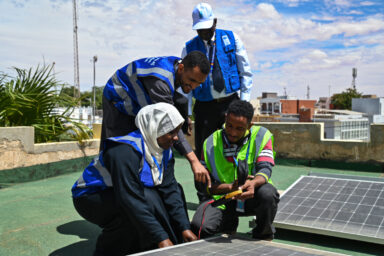Give Caterpillars a ‘Soft Landing’ Under Your Trees.
PICKS are stories from many sources, selected by our editors or recommended by our readers because they are important, surprising, troubling, enlightening, inspiring, or amusing. They appear on our site and in our daily newsletter. Please send suggested articles, videos, podcasts, etc. to picks@whowhatwhy.org.
|
Listen To This Story
|
Give Caterpillars a ‘Soft Landing’ Under Your Trees. The Ecosystem Will Thank You. (Maria)
The author writes, “If you’re like most well-intentioned gardeners, you might give a lot of thought to planting the ‘right’ plants to nourish pollinators and other wildlife, with nectar, pollen, seeds and fruit. But have you given much thought to those animals’ habitats? In addition to sustenance, beneficial insects and critters need a safe home in which to rest, hide, breed and pupate. And one area crucial to their lifecycles is around the base of trees.”
ICE Detains US Citizen for 7 Hours After She Photographed Agents in Oregon (Sean)
From The Oregonian: “An Oregon woman who is a U.S. citizen was detained by US Immigration and Customs Enforcement for about seven hours last Monday after taking pictures of agents’ unmarked cars near a Gresham Chick-fil-A. Berenice Garcia-Hernandez, 25, snapped into action after seeing a Facebook post alerting people to the agents’ presence near the fast-food chain. The person who sounded the social-media alarm said he had been too scared to get pictures of the agents’ license plates. So Garcia-Hernandez headed to Chick-fil-A in her fiancé’s government-plated car, ordered a lemonade at the drive-thru, and took pictures of the agents’ plates herself. … This is where her story and that of the US Department of Homeland Security diverge.”
Cars Are Essential in Most of the US. They’re Also Increasingly Unaffordable (Dana)
From NPR: “From 2000 to 2020, the cost of car ownership rose roughly in line with inflation, according to Navy Federal Credit Union’s data. But starting in the pandemic, it far outstripped the cost of living overall. Partly, that reflects the soaring cost of vehicles. Pandemic-induced supply chain disruptions led to a chip shortage several years ago, reducing the supply of new vehicles and prompting automakers to focus on their most expensive, highest-margin vehicles. The average new car now costs more than $50,000 — a record — according to Kelley Blue Book. The soaring price of new cars raised demand for used cars, pushing the prices for them up, too; on average, used vehicles now run more than $25,000.”
Under Trump, Ticket Sales Plummet for Kennedy Center Performances (Reader Steve)
The author writes, “President Trump’s favorite musical is, famously, ‘Les Misérables,’ but few fans have been storming the barricades to get into the Kennedy Center this season. The Washington Post reports that sales for the current season of music, dance, and theater at the Washington, DC, cultural institution have declined dramatically since the president’s inauguration and his subsequent takeover of the Kennedy Center’s leadership. The Post cites data showing the Kennedy Center has sold only 57% of its tickets from September to mid October, many of which are believed to be comped giveaways. That contrasts with a 93% ticket sale rate through the same period last year.”
One of the World’s Largest Geothermal Networks Is Buried Beneath a Corporate Campus in Rural Wisconsin (Laura)
From Inside Climate News: “You only need a glance at the ‘Intergalactic Headquarters’ of Epic Systems to realize the corporate campus of this medical records software company is not a typical office park. Buildings resemble Willy Wonka’s chocolate factory, the Emerald City of Oz, and Hogwarts Castle. There’s a treehouse conference room, a ‘Deep Space’ auditorium, and a stairway in ‘Heaven.’ However, what’s buried beneath the fantasy-themed campus of one of the nation’s largest privately held tech companies is arguably more unusual and, from a climate perspective, potentially far more significant.”
Strong Friendships May Literally Slow Aging at the Cellular Level (Mili)
The author writes, “Scientists discovered that lifelong social support can slow biological aging. Using DNA-based ‘epigenetic clocks,’ they found that people with richer, more sustained relationships showed younger biological profiles and lower inflammation. The effect wasn’t about single friendships but about consistent connections across decades.”




